07/07/2023
Top Spanish to English Translators: Review of Popular Machine Translation Engines

We’ve collected assessments from Spanish to English translation professionals from around the world to rate the various machine translation engines showcased on MachineTranslation.com. Thanks to the insights of these field experts, we’re better equipped to understand the benefits and limitations of these resources.
Our goal is to make your translation process more efficient and pertinent while also tailoring the output to your unique requirements. As a result, you can feel more confident about the accuracy and relevance of your multilingual exchanges.
Specifications
Language pair: Spanish > English
Language family
-
Indo European > Romance > Spanish
-
Indo European > West Germanic > English
Available Engines: 48 engines support the translation of this pair
Review Type: Human Evaluation
Our Top Spanish To English Translators
Through these expert analyses, you can make educated choices regarding the most suitable tool for your needs. You’ll have the knowledge to identify the optimal machine translation engine for delivering your message.
Google Translate
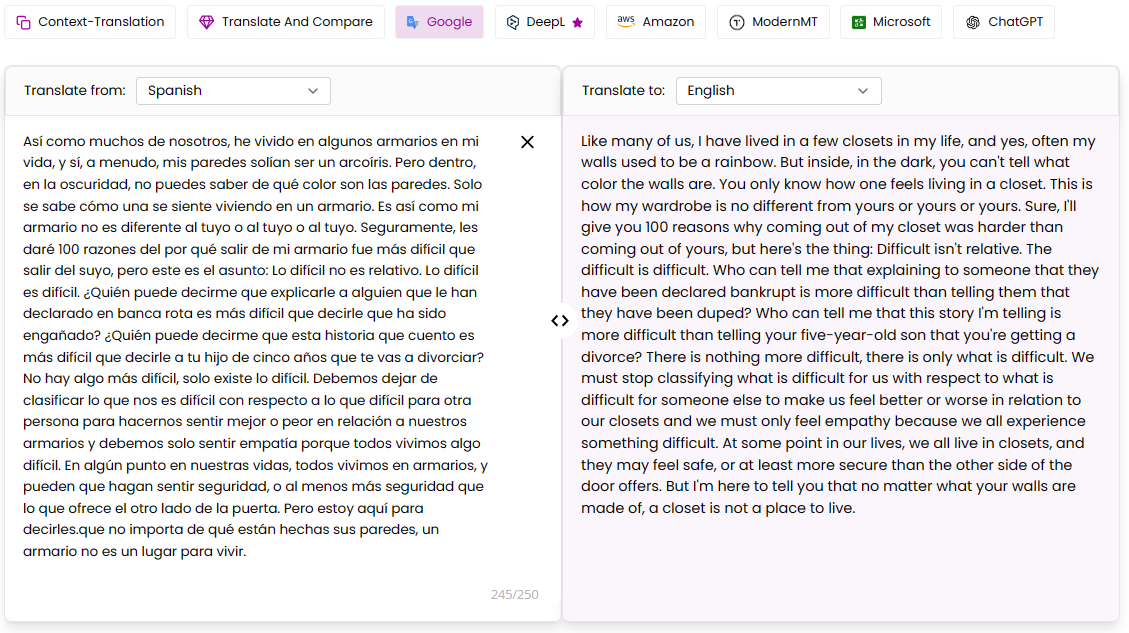
What our translators say about Google Translate for Spanish to English…
“There are several mistranslations and lack of uniformity in glossary choices. The word closet was used at the beginning of the translation and suddenly GT starts to use wardrobe, which is different and does not correspond to the idiom come out of the closet, which is a common way of saying that you are letting everybody know that you are queer. I think that The difficult is difficult is incorrect. It should say what is difficult, is difficult. The other side of the door offers should be changed to What the other side of the door offers (or even shows).”
-Patricia
“Overall, Google Translate was the best engine for this translation. Like all the engines here, it failed to understand the meaning of the core phrase vivir en un armario which is a version of the English phrase living in the closet, meaning to have not come out as gay, etc. The engine assumes that the speaker is talking about a literal closet and doesn’t recognize in the closet as a set phrase. Besides that, Google does a good job making the speech sound natively fluent, particularly through appropriate word choice, good grammar, and a natural flow in the sentences – this is particularly true for the last half of the translation. There are, however, some issues that make it sound non-native, especially the use of the difficulty instead of difficulty. There are also parts that, while technically correct, are places that native speakers would have added in additional words. Together the phrasing of some sentences and occasion vocab mistakes (like the difficult or using wardrobe instead of closet) are the main factors making the translation feel non-native. ”
-Samuel
“This engine correctly delivers the main idea in the source text. However, the choice of words can definitely be improved. For example, it translates the word engañado into duped, which doesn´t convey the intended meaning in the source text. Cheated on would be a better fit for this particular sentence. Also, the use of verb contraction would make this sentence easier to read (they’ve been instead of they have been). ”
- Alexandra
DeepL
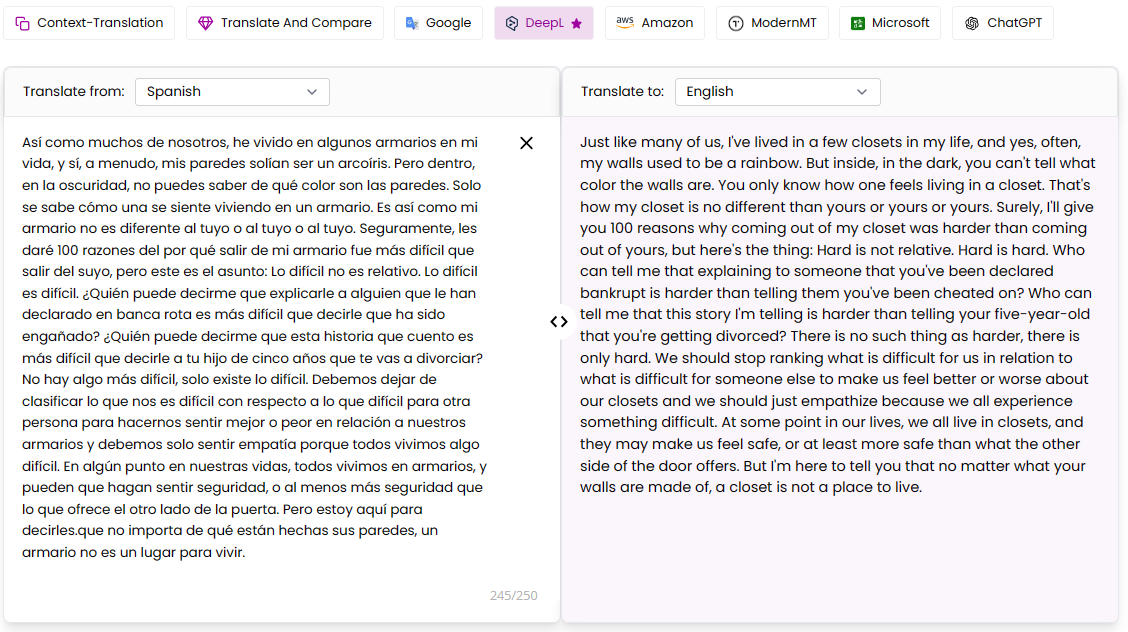
What our translators say about DeepL for Spanish to English…
“This translation is better than others. More safe is incorrect. It should say safer. I don’t think that ranking communicates well what the author wrote in Spanish. In Spanish they use clasificar, so classifying might be a better choice. ”
-Patricia
“Like all the engines here, it failed to understand the meaning of the core phrase vivir en un armario which is a version of the English phrase living in the closet, meaning to have not come out as gay, etc. The engine assumes that the speaker is talking about a literal closet and doesn’t recognize in the closet as a set phrase. DeepL was the poorest performing engine. First and foremost, its translation sounded deeply unhuman, as if the translation made been performed sentence-by-sentence or word-by-word without a human sense of the whole product. The translation also contained a number of technical errors and mistakes in vocabulary, including some easier terms. In situations where multiple meanings exist for the same phrase and the correct choice is context-dependent (like sido enganado), DeepL almost always picked the wrong option and, thus, conveyed an incorrect meaning. It is also the only engine to have experienced pronoun/subject issues in the translation, false translating su as you’ve been instead of they’ve been. The translation produced was also missing some commas, making it the only engine to have issues with punctuation. ”
-Samuel
“This engine delivers accurately the intended meaning from the source text. I’d like to point out that the choice of the words harder and cheated on is right on point. However, they’ve would be a better fit for this sentence than you’ve, since the sentence isn’t intended for a particular person; it is aimed at an audience. ”
-Alexandra
Amazon
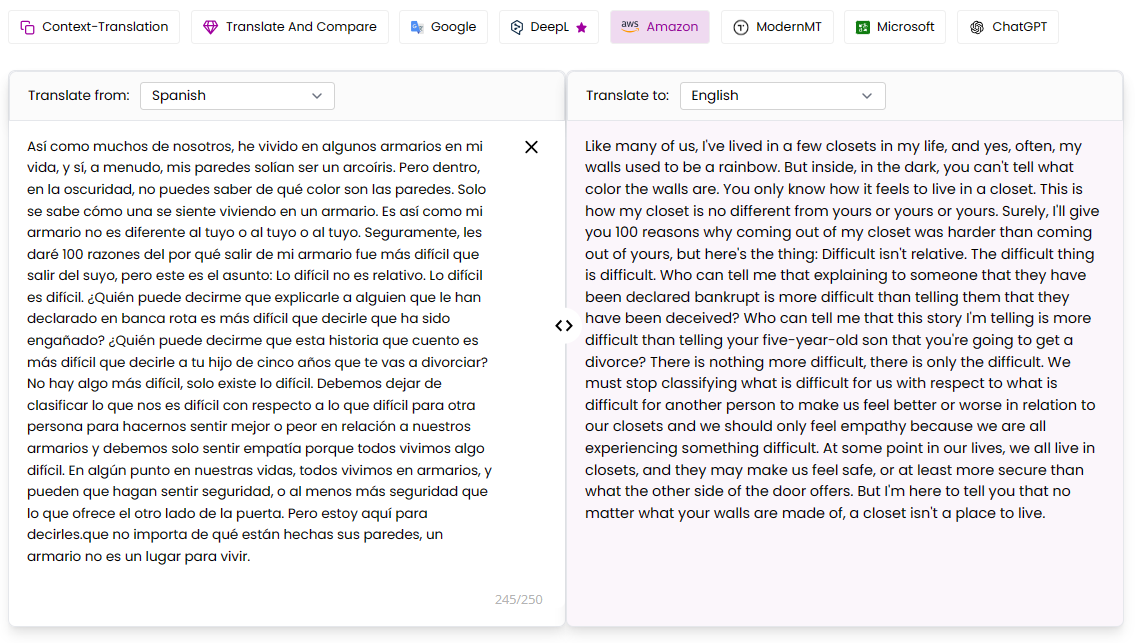
What our translators say about Amazon for Spanish to English…
“Confusing sentences. I don’t agree with the sentence there is only the difficult. It sounds really awkward. Maybe it would be better to say: there is only what is difficult. Most sentences are quite long and at least the last ones should be divided into two sentences. The repetition of the word difficult should be avoided. ”
-Patricia
“Like all the engines here, it failed to understand the meaning of the core phrase vivir en un armario which is a version of the English phrase living in the closet, meaning to have not come out as gay, etc. The engine assumes that the speaker is talking about a literal closet and doesn’t recognize in the closet as a set phrase. Amazon’s translation sounds both non-native and slightly non-human. The grammar is very good from a technical aspect, but, like all the engines, it failed to account for the fact that English needs different tenses than exist in the Spanish original. The main factor making the Amazon engine sound non-native is poor choice in vocabulary, including the difficult, but also some word choice decisions that would not be made by most native speakers. The paragraph also lacks a natural flow, contributing to a sense of it being machine translated.”
-Samuel
“The main idea of the source text is delivered correctly in English. The choice of words could be improved, as cheated on would be a better fit than deceived. Also, the use of verb contraction would make this sentence easier to read (they’ve been instead of they have been).”
-Alexandra
Microsoft Translator
What our translators say about Microsoft Translator for Spanish to English…
“Lack of fluidity and some confusing sentences. Out of nowhere, the tool starts to use wardrobe, while in the previous sentences, closet was used. Again, there is this problem with the difficult is difficult, instead of translating this as what is difficult is difficult. Experience is a better translation than live, because they are talking about something that one actually experience. This was translated correctly by some tools.”
-Patricia
“Like all the engines here, it failed to understand the meaning of the core phrase vivir en un armario which is a version of the English phrase living in the closet, meaning to have not come out as gay, etc. The engine assumes that the speaker is talking about a literal closet and doesn’t recognize in the closet as a set phrase. Microsoft is close to the front of the pack alongside Google and ModernMT. The translation is produced sounded non-native, primarily as a result of word choice decisions; the engine used words that a native speaker would have been unlikely to in that context. In addition, there are some mistakes, like the difficult, that make the language clearly non-native. The Microsoft translation is the most formal of the translations and this formality – primarily expressed through word choice – contributes to the sense of non-nativeness in this translation. However, while this translation reads like a non-native speaker writing too formally because they don’t know how to write otherwise, formality is appropriate in some cases. Microsoft may be a good engine for more formal settings, such as legal translation or business correspondence. ”
-Samuel
“This engine is able to deliver correctly the main idea contained in the source text. However, the choice of words could definitely be improved. Also, the use of verb contraction would make this sentence easier to read (they’ve been instead of they have been). ”
-Alexandra
ModernMT
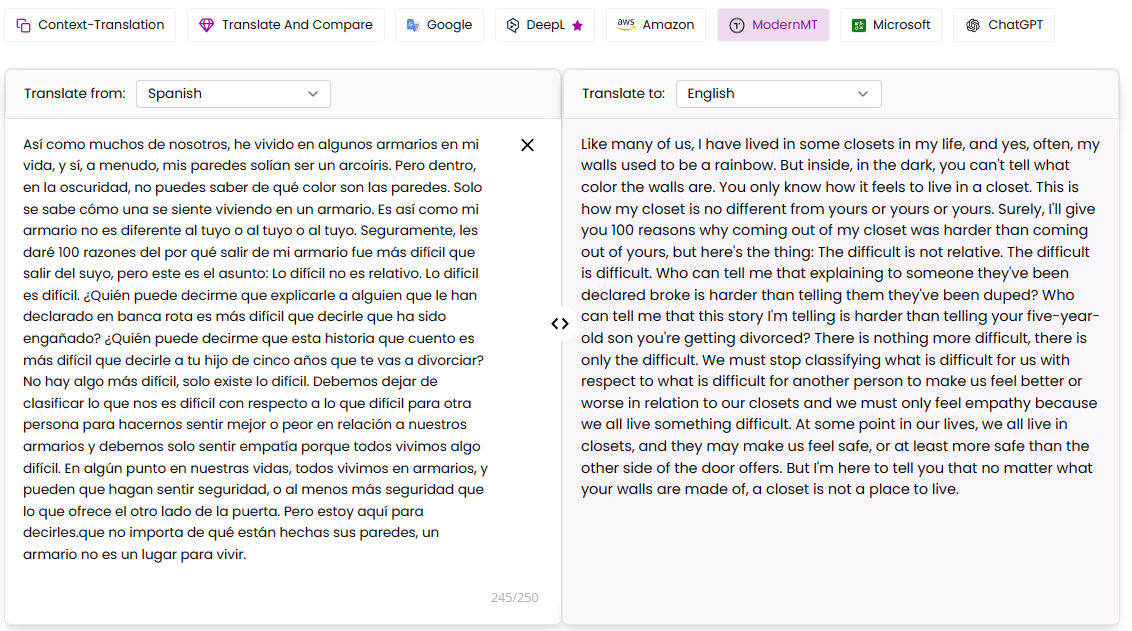
What our translators say about ModernMT for Spanish to English…
“Long and confusing sentences. The difficult is not relative should be what is difficult is not relative, to better convey the meaning of the source sentence. There is only the difficult is a strange sentence, because it should say there is only what is difficult. I would also change we must only feel empathy to we only have to feel empathy.”
-Patricia
“Like all the engines here, it failed to understand the meaning of the core phrase vivir en un armario which is a version of the English phrase living in the closet, meaning to have not come out as gay, etc. The engine assumes that the speaker is talking about a literal closet and doesn’t recognize in the closet as a set phrase. ModernMT performed fairly well and is at the front of the pack alongside Google and Microsoft. Overall, the translation it produces still sounds non-native, however. The main issues encountered for ModernMT are related to word choice, as the engine makes word choice decisions that a native speaker would generally not make. There are also some mistakes, such as the difficult instead of difficult or uses must for deber when most native speakers would translate the term as should. However, despite these word choice issues, ModernMT does a good job recreating a natural flow to the writing. In fact, out of all the translation engines, ModernMT comes the closest to replicating the natural flow of human-produced writing. The translation produced by ModernMT doesn’t come off as machine-produced, but the product of a non-native speaker who is a good writer but has made some mistakes in word choice. ”
-Samuel
“The main idea in the source text is correctly delivered. Even so, the choice of words makes the text somewhat awkward and could definitely be improved. For example, the word duped isn’t as appropriate as cheated on would be. ”
-Alexandra
ChatGPT
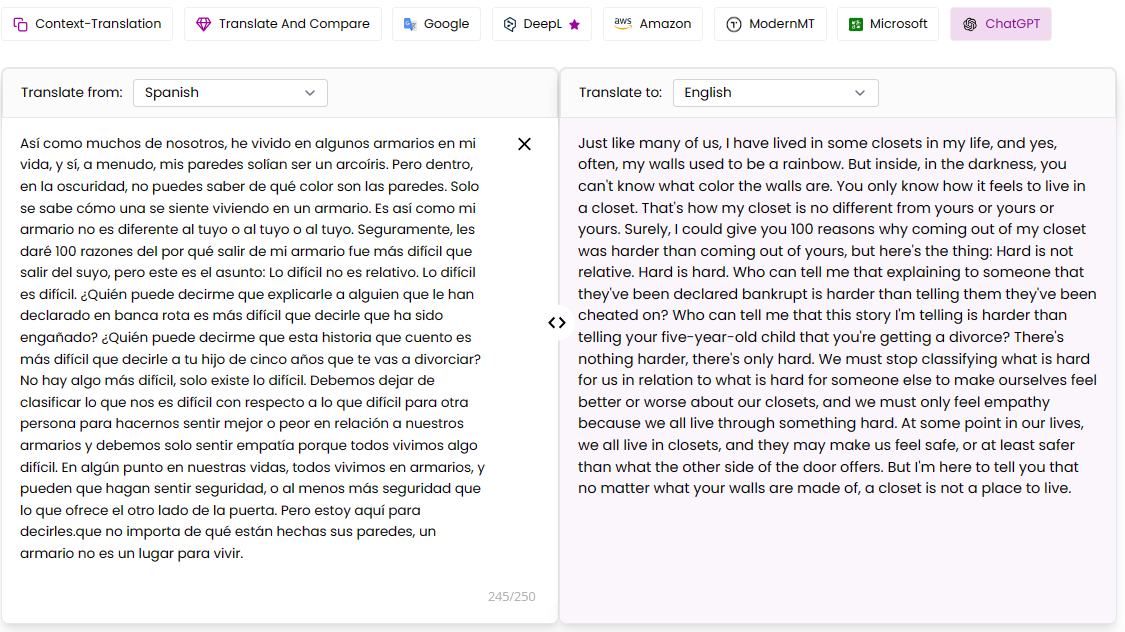
What our translators say about ChatGPT for Spanish to English…
“Long and confusing sentences. The difficult is not relative should be what is difficult is not relative, to better convey the meaning of the source sentence. There is only the difficult is a strange sentence, because it should say “there is only what is difficult.” I would also change we must only feel empathy to we only have to feel empathy.”
-Patricia
“Like all the engines here, it failed to understand the meaning of the core phrase vivir en un armario which is a version of the English phrase living in the closet, meaning to have not come out as gay, etc. The engine assumes that the speaker is talking about a literal closet and doesn’t recognize in the closet as a set phrase. ChatGPT’s translation sounds non-native, primarily due to word choice, including a number of mistakes made in the translation. The most glaring of this is translating side enganado as cheated on, which does not make sense in the context of the sentence. Some of the other word choices also sound awkward or non-native.
The upside of ChatGPT is that some word choices, in particular the translation of dificil as hard rather than difficult make it sound much more casual and conversational than other translations. ChatGPT may be well suited for recreating more informal or casual speech and writing, although accurately recreating native casual writing will be difficult without first addressing the word choice errors in the engine. ”
-Samuel
“The main idea of the source text is delivered correctly in English. The choice of words could be improved, as cheated on would be a better fit than deceived. Also, the use of verb contraction would make this sentence easier to read (they’ve been instead of they have been).”
-Alexandra
More Languages:
English to Spanish
English to French